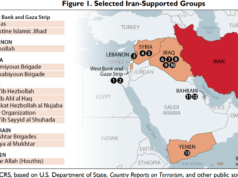Last month’s Palestinian Authority (PA) ploy at the United Nations to gain recognition of statehood represents the continuing Palestinian strategy to avoid negotiating a peace agreement with Israel. While it would be unfortunate and unhelpful to reward bad behavior, there is an even more fundamental reason why members of the UN Security Council are still on the fence: Hamas.
Recognizing a Palestinian state would effectively recognize that terrorist organization as a legitimate Palestinian player.
Contrary to the claims of some analysts, Hamas has not adopted a more moderate stance or pragmatic ideology over recent years. As Hamas prime minister in the Gaza Strip, Ismail Haniyeh, reiterated last month:
“We repeat today that we are with the establishment of a Palestinian state on any liberated part of Palestinian land that is agreed upon by the Palestinian people, without recognizing Israel or conceding any inch of historical Palestine.”
Hamas sees accepting a Palestinian state in the West Bank, Gaza Strip, and East Jerusalem as merely another step toward its larger goal, namely, taking over all of Israel. The problem with the PA’s bid at the UN was best summed up last month by a senior Hamas official, Khalil al-Haya: “Recognition should be sought for the entirety of the Palestinian territory, and the Palestinian right to live within this country’s borders acknowledged. We ask the UN to annul the entity that decided to settle on the land of others,” he said, referring to Israel. So much for moderation.
The April 2011 Fatah-Hamas reconciliation did not represent the softening of Hamas’s political agenda, but rather the hardening of Fatah’s stance vis-à-vis Israel. It is a marriage of convenience where either side will back away at whatever point suits their interest. The attempt to gain recognition for statehood at the UN provided the lowest common denominator upon which the two rivals could agree. As PA President Mahmoud Abbas explained in his May 16 op-ed in The New York Times,
“Palestine’s admission to the United Nations would pave the way for the internationalization of the conflict as a legal matter, not only a political one. It would also pave the way for us to pursue claims against Israel at the United Nations, human rights treaty bodies and the International Court of Justice.”
Both rivals agree on the need to avoid direct negotiations with Israel, preferring for now to attack Israel in the international community through lawfare. The shared strategy is to continue to chip away at Israel’s legitimacy.
But if Abbas assumed that a show of Palestinian unity would secure Fatah’s place as the leader of the Palestinian struggle, he had better think again. Since its 2007 takeover of the Gaza Strip, Hamas has strengthened its hold on the Palestinian political environment at Fatah’s expense. It has done so not by popularity but by brute force and violence. Gaza is now a Palestinian terrorist state with Hamas-controlled governing institutions, police and border forces, judiciary and laws, media outlets, an education system, businesses, and more. Given Iranian material support, the increase in available weapons from Libya, and the new ease with which weapons can be smuggled into Gaza through Egypt, Hamas’s paramilitary capabilities are only growing, and the strides it’s making are not confined to Gaza alone.
Last month the Israeli security agency Shin Bet disclosed that Hamas has increased its reach and military capabilities in the West Bank. Over the last few months the agency has arrested dozens of Hamas terrorists working within 13 different cells in the West Bank and Jerusalem planning attacks in Israel. And the Palestinian Authority’s forces in the West Bank are no match for Hamas. As early as 2007, Hamas leader Mahmoud al-Zahar explained, “Israel says the party in Ramallah (Fatah) serves Israel, and if Israel quits the West Bank, Hamas will take it over. And we say this is true.” Hamas is simply biding its time.
According to recent reports, the Palestinian Authority has not yet secured the nine UN Security Council votes it needs to be recognized as a state and force an American veto. Those states have much to consider. Voting in favor of the PA’s proposal would put an international stamp of approval on Hamas and reward Fatah for refusing to negotiate with Israel. Legitimizing an armed terrorist group as a party in Palestinian politics is not a recipe for stable statehood; it is the recipe for creating political deadlock, instability, and continued civil war à la Hezbollah and Lebanon. A vote in favor increases the likelihood of conflict and lessens the chance for peace.
Samara Greenberg is a senior research associate at the Jewish Policy Center and deputy editor of the publication, inFocus Quarterly. She is editor of the forthcoming research project, GazaWatch.





